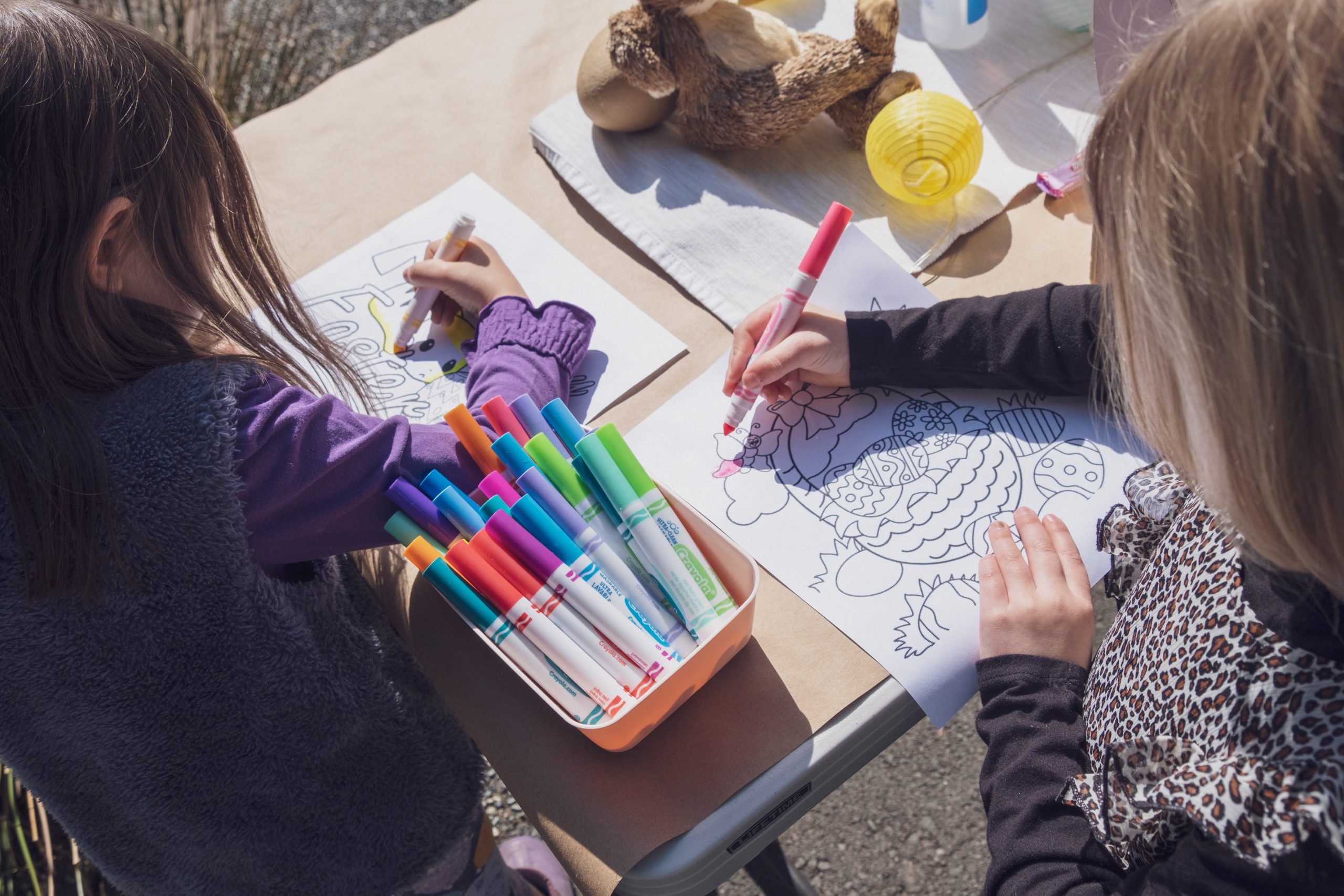“You didn’t make it to the potty, but we will try again next time,” I cheerily say for what feels like the ten thousandth time. Once her back has turned, I hang my head in exhaustion.
Have you ever thought about what it was like to be potty trained all those years ago? I do. Well, at least lately, because my waking hours have revolved around another person’s toilet habits.
Due to this, I have recently read about a lot of different potty-training methods: some with near-magical three-day promises, some that swear by the power of mini M&M’s, and some that suggest your child should ditch wearing pants for a few days.
But you know what all of these methods have in common? Accidents.
Children learn what a potty accident is by having a potty accident. In fact, it is kind of funny that we even call it an “accident,” when three days ago the exact same thing was totally acceptable.
A little unfair, don’t we think?
This, however, is how the learning process begins!
We grow a new skill by learning what it looks and feels like to fail at said skill.
Failure is a natural part of life. We are expected to fail at something we have never done before potty training, walking, driving a car, and probably our first romantic relationship.
Every mistake becomes an opportunity to better understand ourselves and how we need to shift what we are doing to get closer to the goal at hand.
For something like potty training that has a huge body/brain relationship, each “accident” helps a child begin to build interoception, or essential bodily awareness that is the foundation for more complex skills like emotional regulation [1, 4, 5].
Usually, we have a whole lot of grace and patience for the purpose of failure when it comes to something like potty training. But we do not always have the same level of understanding for other mistakes our children, and ourselves, make.
Knowing how to fail well is critical to the human experience. What a privilege we have as parents to watch our children fail, then share with them the joy of turning that failure into a key part of their development.
_________________________________
Modeling a healthy response to failure
I don’t have to tell you that children not only hear, but mentally collect just about everything you do and say. Children are building their understanding of the world and relationships with every passing hour. But I do not say this to scare you! We can use those sponge-brains as an opportunity to model expectations for family culture.
How do you respond when you make a mistake of your own? If it is something like dropping a jar in the kitchen or taking a wrong turn, something that does not directly involve your relationship with your child, try narrating your response aloud like this:
Aw man, that is SO frustrating. Grown-ups make mistakes sometimes, too. I’ll clean that up and be more careful next time.
Or maybe,
Uh oh, Mommy took a wrong turn. I better take a moment to pull over and figure out where we need to go next. Thank you for being patient with me.
This in-the-moment self-reflection allows your child to learn to healthily conceptualize a response to a mistake. Be sure to often describe your initial feeling. You are modeling that it is okay to be mad, frustrated, or sad about it. But then, follow up with how you choose to think about the mistake and behave accordingly.
You can also add recognition that your mistake impacted others around you. It sounds like a lot to think about, but the above examples give some succinct ways to model this. Remember, you will not do this perfectly. You are practicing, too!
Now, what about when you make a mistake that directly involves your relationship with your child? Maybe you yelled at them in anger, using unkind words. Maybe you blamed them for something that was not their fault. You recognize your mistake, and your child does too. What now?
Repair.
Repair means that you are apologizing with humility and treating your child with respect. Think, how do you want your child to apologize to you and to others? With a list of excuses and drawn-out explanations? Or with direct acknowledgment of the wrong, and with sincerity? Repair also looks like saying how you want to be better at this in the future. It is best to apologize when both of you have calmed down and are in a state in which you can communicate with your upstairs brain more readily.
I am so ashamed of how I spoke to you a few minutes ago. That is not how I want to talk to you. I was wrong and I want to be better at how I speak when I am upset. Can I try it again?
Even better, model how you WISH you had spoken to them with a “re-do!” Show them what your “goal” is that you are working on emulating.
This is the best possible way to teach your child how to repair, by modeling it in real-time when you yourself have made a mistake.
Using your child’s mistakes to help them build key skills
Teaching a child to manage failure with a combination of humility, dignity, and self-reflection aids in the development of self-regulation skills, the ability to problem solve, and a sense of empathy and forgiveness to others [2, 3].
The idea that “I can learn from this” and “I have the power to change the story next time” empowers a child, instilling agency and confidence for future challenges.
Research shows that a child’s ability to narrate past mistakes as learning opportunities is a predictor of future success.
“thinking about their own agency, about specific actions they have taken in order to succeed in the past, reminds students that they have found ways to accomplish important goals. It supports the idea that they are capable protagonists in their own life stories” [2].
Identity Development
Supporting your child in their mistakes is a key aspect of identity development, as well.
“I messed up” is a vastly different message than “I am a mess-up.”
Helping your child distinguish a mistake from their overall identity or character has a lifelong impact. It is also an opportunity to integrate family spiritual beliefs into your child’s understanding of self.
A few years ago I did an educational video for ChristianWorks about how affirmations about spiritual identity can help a child recover from making a mistake and remember who they are despite their actions. Check it out here!
Practical Reminders
Building on mistakes in a positive way doesn’t have to be an additional aspect of your family life; it is not a new activity to tack on to a growing calendar. It is simply a way to re-conceptualize the rhythms your family already has set in place. Your responses to your children and the way you talk to them about these concepts can begin to enhance their development journey and sense of self.
This article that I found rounds up these ideas into the following, succinct reminders
4 ways to help a child learn from mistakes:
- Talk openly about mistakes
- Reframe mistakes as opportunities for learning
- Spot opportunities around you
- Make it a habit
At the end of the day,
mistake-making is yet another chance to empower your children and infuse upon them core family values.
Who are we?
What do we believe?
How do we treat others?
Most of the time, teaching your child about learning from their mistakes is a lot more modeling and practicing than direct teaching. You are coaching them through the difficult moments and providing examples of how to do it with each passing day.
You are capable of this because I know for sure that you make mistakes, too! Now let’s turn those mistakes into learning opportunities, together!
References:
1. Craig, A. B. (2003). Interoception: The sense of the physiological condition of the body. Current Opinion in Neurobiology, 13(4), 500–505. https://doi.org/10.1016/s0959-4388(03)00090-4
2. Jones, B. K., Destin, M., & McAdams, D. P. (2018). Telling better stories: Competence-building narrative themes increase adolescent persistence and academic achievement. Journal of Experimental Social Psychology, 76, 76–80. https://doi.org/10.1016/j.jesp.2017.12.006
3. Making Caring Common. (2022, November 17). How to help kids learn from mistakes. Making Caring Common. https://mcc.gse.harvard.edu/resources-for-families/learning-from-mistakes-2
4. Neff, M. A. (2023, February 12). What is interoception and how to improve yours? Insights of a Neurodivergent Clinician. https://neurodivergentinsights.com/blog/what-is-interoception
5. What is interoception? Kelly Mahler. (2021, May 17). https://www.kelly-mahler.com/what-is-interoception/




